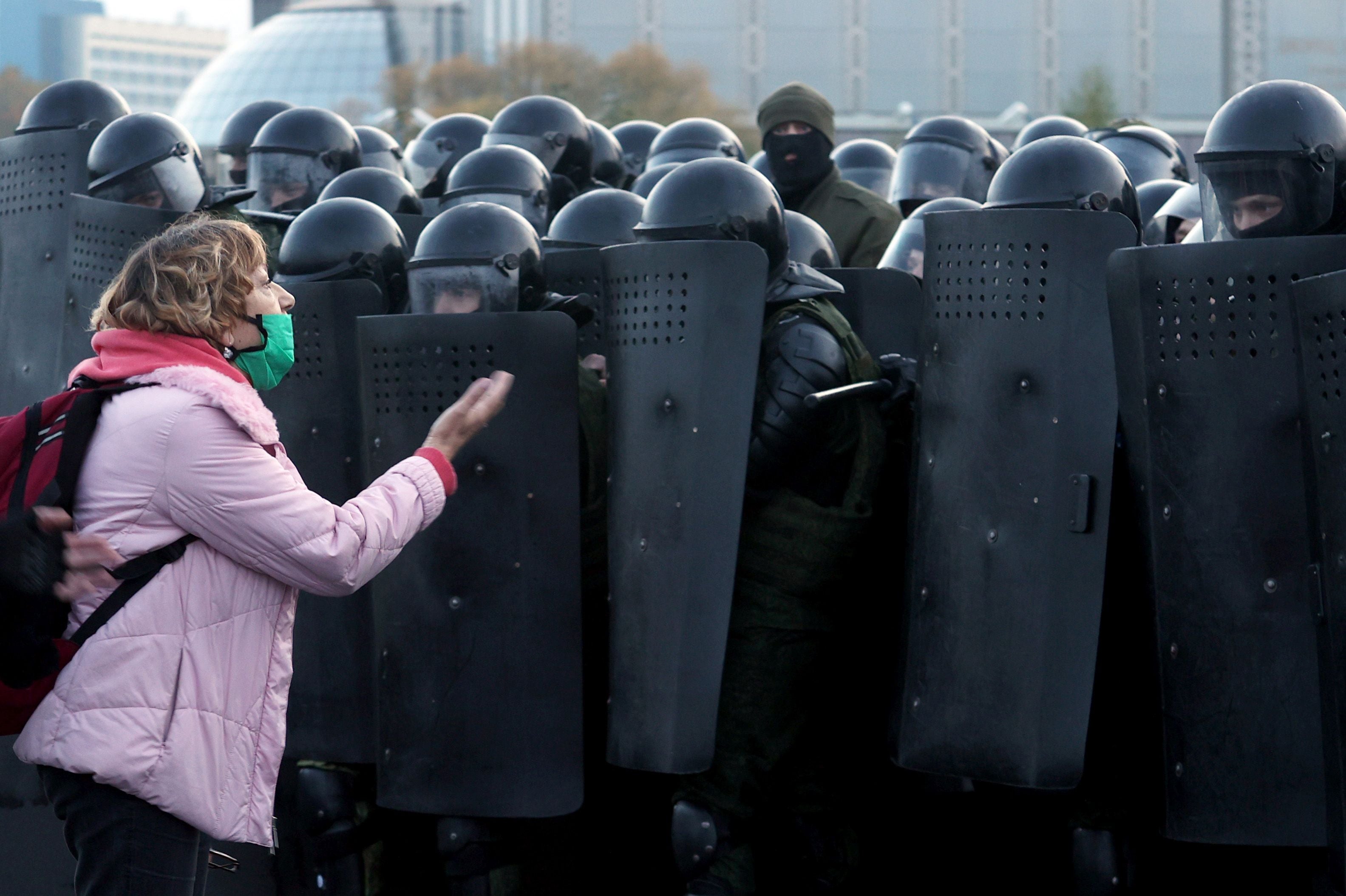Belarus riot police violently disperse mass protests ahead of opposition ultimatum
Svetlana Tikhanovskaya is demanding the president resign and put an end to the violence

Over a hundred thousand protestors poured onto the streets of Belarus's capital Minsk on Sunday, the final day of an opposition ultimatum demanding strongman Alexander Lukashenko resign or face a national strike.
The protests, which began nervously, were eventually dispersed by government forces with stun grenades and rubber bullets. Local media reported at least one serious injury, with a man in hospital after a rubber bullet pierced his stomach.
Mr Lukashenko is unlikely to respond to the midnight deadline set by rival Svetlana Tikhanovskaya, the opposition figure who many believe won the presidential election in August. But the protest turnout, at the higher end of predictions, would appear to have given him cause for concern.
In the eleven weeks since the disputed election, Belarusian protests have evolved through several phases of violence and mass protests. Neither side has been able to declare victory, and Belarus today answers to an uneasy diarchy. Ms Tikhanovskaya and the opposition control the streets. But Mr Lukashenko retains control of most levers of government and repression.
Ms Tikhanovskaya's 25 October ultimatum — demanding his resignation, an end to violence, and the release of all political prisoners — was an open attempt to split the regime.
Mr Lukashenko’s initial reaction to it was to call a huge pro-government rally for the same day. According to local reports, the government machine was sent into overdrive, with officials and factory managers reportedly marshalled to ensure a good turnout. But the longtime leader called the event off at the last minute claiming he was worried about crowd control. The opposition suggested he couldn't get the numbers.
In the lead up to the demonstrations, Mr Lukashenko said he was "changing tactics" and would "search out" anyone involved in protests. His police leaders suggested firearms could be used "humanely" to this end.
On Sunday, tactics followed many of the traditions set in previous weeks, designed to make life difficult for the demonstrators. Hours before the advertised 2pm start of protests, for example, authorities sealed off major thoroughfares, closed central metro stations, and turned off the mobile internet networks.
Initially, authorities appeared to refrain from the open violence and aggression on display in previous outings. According to the Viasna Human Rights Centre, at 6pm local time (3pm GMT) daily arrests were running at 59, compared to 250 arrests seven days ago. But closer to the evening, police began to use stun grenades and rubber bullets to disperse crowds.
Before the dark turn of events, Ms Tikhanovskaya’s team described Sunday’s protest as a demonstration of the “strength, vitality and maturity” of their movement.
“We understand Lukashenko will not voluntarily leave, but those around are beginning to see he has run out of resources and any legitimacy,” said Anna Krasulina, a spokesperson for the exiled opposition leader.
“The fact he was unable to bribe enough people to attend his own rally shows the extent to which he has lost control of the machine," she added.
Ms Krasulina said internal tensions would become clearer when the protests move to a new phase of national strikes on Monday. These efforts represent a second attempt to get workers to down tools after walkouts petered out in late August following pressure from the authorities.
The spokesperson refrained from predicting how many state enterprises would answer the call tomorrow. Instead, she claimed, “partisan groups” were preparing for "every eventuality" that would be thrown at them. She refrained from offering further details.
With dozens of military vehicles taking up positions around the presidential palace by the evening, opposition "partisans" clearly weren’t the only ones preparing.
Join our commenting forum
Join thought-provoking conversations, follow other Independent readers and see their replies
Comments

Bookmark popover
Removed from bookmarks